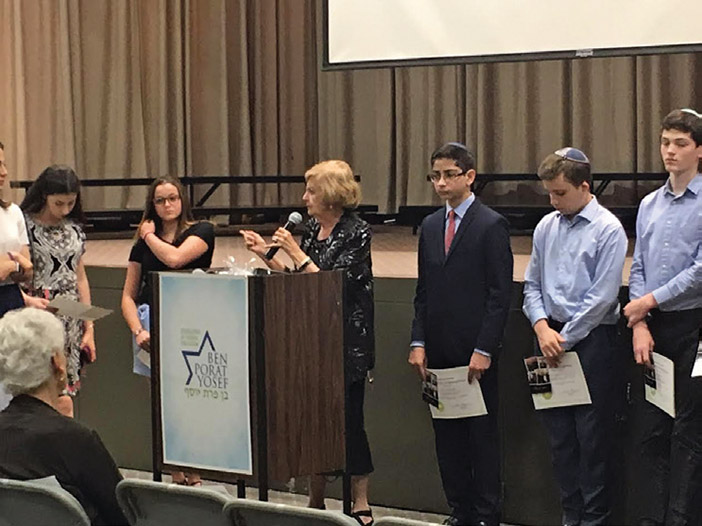
On Thursday, June 14, Ben Porat Yosef hosted its first-ever “Names, Not Numbers©” documentary screening. While this is BPY’s first year hosting the program, “Names, Not Numbers©” is now in its 14th year.
Developed and created by Tova Rosenberg, director of the Hebrew language department at MTA, “Names, Not Numbers©” transforms the teachings of the Holocaust by taking it beyond traditional classroom walls and turning it into an interactive, creative and empowering educational lesson with students, encouraging them to see the Holocaust through the eyes of individual people.
The students, under the watchful eye of Amanda Dryer, a Ben Porat Yosef instructor, worked tirelessly as they were taught how to properly conduct interviews, use professional cinematic production equipment and were even given classes in order to raise the students’ awareness and sensitivity to the situation. Students became reporters, journalists, audio engineers, active listeners and filmmakers as they took part in this once-in-a-lifetime opportunity. Those lucky enough to be in attendance on the eve of the 14th got the chance to watch as the students of Ben Porat Yosef placed the culmination of their work on display for family, friends, teachers and faculty to see as everyone gathered in the auditorium to view the hour-long film.
Head of School Rabbi Saul Zucker set the tone for the evening prior to the video screening as he offered a simple mashal (story parallel). Rabbi Zucker spoke of an outdated Eastern European coin that has been in his possession for a long time, saying that he had always wondered where the coin had been. He lamented its inability to speak up and inform him. He continued, saying that this generation is extraordinarily fortunate in that “we have living treasure amongst ourselves,” with several first-hand Holocaust survivors not only alive and well, but in attendance for the evening. Rabbi Zucker reminded everyone that it is their individual responsibility to pass on these stories and keep these memories alive and relevant.
The movie was beautiful, skillfully crafted and heart-wrenching all at the same time. The video detailed the students’ process as they acquired the skills necessary to interview one of four survivors: Rabbi Arthur Schneier, Tova Friedman, Stella Levi and Felice Stokes. The students sat through seminars given by multifaceted professionals and took turns using different equipment. The students were properly briefed on what types of questions to ask the survivors and how to obtain the most information while still being sensitive and understanding.
The film detailed the lives of four survivors who suffered in different places at different ages, thus shedding light on how their experiences varied greatly from one another’s. The first interview, with Rabbi Schneier, mostly detailed events in Austria-Hungary as they began to unfold and the situation grew dangerous for Jewish people. Rabbi Schneier recalls the morning after Kristallnacht; as he walked to school, he passed by and watched as he saw the shul he attended as a boy burn in flames, noting that the fire department services of the town were only in the area to protect the neighboring houses from the shul’s blazing fire. In his time as a child, children became accustomed to playing games such as Germans vs. Jews.
Friedman detailed the immense horrors of being a prisoner in Auschwitz from the perspective of a very young girl who never experienced a life without violence, hate and death. Having been in captivity for as long as her memory goes back, she tells this story: As she was on her way to the crematorium, Friedman heard her mother scream her name from a separate camp. Her mother asked her what was happening and Friedman responded with the honest truth. Upon hearing this, the group of women from her mother’s camp began to weep, although she couldn’t fathom why they were so upset. In her mind, Friedman was convinced that Jewish children are supposed to die. Their fate was predetermined and that was how the world was supposed to work. She knew nothing of safety or freedom.
After interviewing the survivors, which was the true culmination of their hard work, the students were given the opportunity to openly discuss the concept of emunah in God in light of the events of the Holocaust. It is truly a contentious topic that has perplexed many religious and faithful people, yet the students were engaging and willing to take part.
Finally, the audience was addressed by 12 of the students who took part in the “Names, Not Numbers©” project as they spoke about what this experience meant to them and the lessons they have taken away from it. Student Joshua Kohn reminded everyone in attendance that often in discussing the Holocaust as a whole, people do just that—and discuss the entirety of this atrocity as a single event. The six million Jews who perished are lumped together into a single event in time, and it is important to remember that “each person has their own story. Each person is their own world.” The individual levels of suffering cannot be included in the number six million.
Maxwell Milstein is a student at Baruch College and a Jewish Link summer intern.
By Maxwell Milstein








